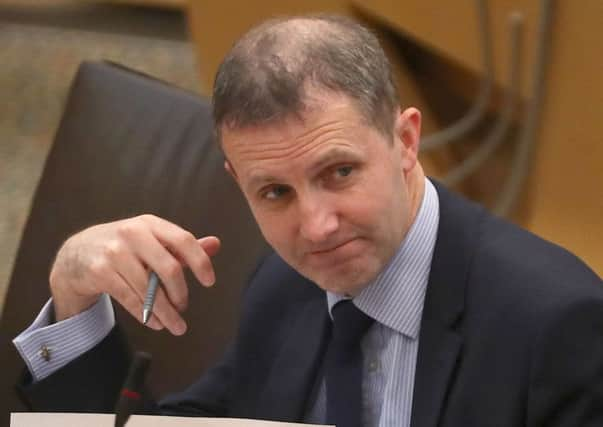Tom Peterkin: Police Scotland's problems are bigger than the SNP


Moments later an email dropped in the inboxes of journalists.
From the office of the Police Investigations and Review Commissioner (PIRC) it announced that a fifth – yes, a fifth – complaint concerning allegations of gross misconduct had been lodged against the chief constable, Phil Gormley.
Advertisement
Hide AdAdvertisement
Hide AdIt says something about the current difficulties affecting the police in Scotland that eyelids were barely batted when PIRC’s missive came to light on Tuesday afternoon.
Things must in a sorry state when demands for a Cabinet minister’s resignation and complaints against the nation’s most senior police officer are almost seen as par for the course.
But, as the travails of Scotland’s single police force and its associated political machinations continue to hog the headlines, it would be wrong to view the latest shenanigans with anything other than the utmost seriousness.
The controversies engulfing Mr Matheson, Mr Gormley and others involved with Police Scotland reflect a dysfunctional system that erodes public trust in our justice system and does nothing for the morale of the hard-working officers on the ground. One suspects that the Victorian lyricist W S Gilbert’s crie de coeur that “a policeman’s lot is not a happy one” most certainly applies to the men and women of Police Scotland.
Mr Gormley has consistently denied any of the allegations made against him, but the existence of a fifth complaint must make it increasingly unlikely that this highly experienced police officer will return to his position.
He remains sidelined on special leave, not a happy state of affairs for an organisation that has been plagued by leadership controversies since the eight regional police forces were merged to form Police Scotland almost five years ago.
Meanwhile Mr Matheson is facing accusations that he has been interfering with the activities of the Scottish Police Authority (SPA), the organisation which is supposed to act as Police Scotland’s independent oversight body. Questions over Mr Matheson’s relationship with the SPA were raised when it emerged that he had discussed the SPA’s decision to let Mr Gormley come back to work with the SPA’s former chairman Andrew Flanagan.
Mr Flanagan has told parliament that he felt he had no option but to block Mr Gormley’s return after the Justice Secretary’s intervention.
Advertisement
Hide AdAdvertisement
Hide AdMr Matheson’s line of defence has been that he was right to question the decision because the SPA had failed to follow “due process” before reinstating him. The Justice Secretary pointed out that the chief constable would have ended up working alongside those who had made complaints against him.
There are those who have sympathy with Mr Matheson’s argument – including the new SPA chair Professor Susan Deacon. But any perception of political interference in a centralised police force is not a good look.
Further questions about interference were raised at the weekend when an email from one of Mr Matheson’s senior officials, Don McGillivray, found its way into the public domain.
The email, sent in November last year, sought to delay the publication of a report into the SPA by PIRC until the “CC (chief constable) issue had moved on a bit”.
Mr McGillivray’s email received short-shrift from the commissioner Kate Frame, who replied, saying: “My perception of your remarks is of governmental inference with my independence.”
The robust nature of her response has helped Mr Matheson’s defence, which is built round his claim that he knew nothing of the email until last Thursday. So far, the calls from the Tories and Labour for Mr Matheson’s head have yet to bear fruit. But whatever happens to Mr Matheson’s political career, it can be argued that his troubles are symptomatic of deeper problems with the way Police Scotland is held to account. When Scotland had eight separate forces, policing was examined by regional police boards which saw local councillors provide a form of democratic scrutiny.
Now, however, running and scrutinising the police is the responsibility of a relatively small band of people – the Justice Secretary, the SPA, the chief constable and PIRC to name a few.
The appointment of the chief constable, the SPA chair and the PIRC are within the gift of the Justice Secretary who also approves the police budget and the policing plan.
Advertisement
Hide AdAdvertisement
Hide AdGiven the concentration of influence in such a small circle, it is perhaps little wonder there is a perception problem. Furthermore, the performance of the SPA has been of long-standing concern. Various reports have criticised its lack of transparency and closeness to government. Clearly something has to change in order to give the system some meaningful checks and balances. Perhaps it is time for an overhaul of the SPA.
There are those like Willie Rennie of the Lib Dems, who believe there is a need for more local authority representatives on the board.
And there are many, including the Tories and Lib Dems, who argue that the SPA should be appointed by parliament rather than ministers.
Until some sort of action along those lines is taken, the controversies surrounding policing in Scotland are unlikely to go away.
